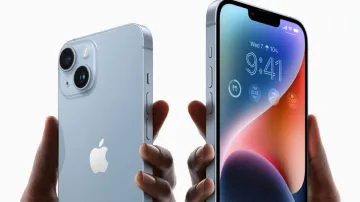Apple to face anti-trust lawsuit by Biden administration for restricting third-party hardware, software
US Justice Department has endorsed the lawsuit following years of allegations by critics that Apple has harmed competition with restrictive app store terms, high fees and its “walled-garden” approach to its hardware and software.

Washington: In yet another jolt to American multinational corporation and technology company, Apple, the Biden administration is set to sue the global mobile phone brand with an antitrust lawsuit on Thursday. Citing sources, CNN reported that the US Justice Department has endorsed the lawsuit following years of allegations by critics that Apple has harmed competition with restrictive app store terms, high fees and its “walled-garden” approach to its hardware and software. Also, the other allegations include Apple tightly controls how third-party tech companies can interact with the tech behemoth’s products and services.
US President Joe Biden has called for the Justice Department and the Federal Trade Commission to vigorously enforce antitrust statutes. Citing an example, the report claimed that Apple allows its customers to send high-quality media files to its devices but slows down the same when it comes to its competitor Android phones. Last year, Apple had assured that it would enhance the interaction speed and quality with Android.
Apple's has a monopoly: Lawsuit claims
Besides, the lawsuit also claimed that Apple gives priority access to its own products while restricting other companies from using it. For example- when iPhones interact with AirTags-- a tracking device developed by Apple which acts as a key finder, which helps people find personal objects-- swiftly as compared to other competitors' products. Also, the criticisms from the tech world claimed Apple is imposing a heavy charge of 30 per cent commission on most sales through its app store.
“Consumers should not have to pay higher prices because companies violate the antitrust laws,” Attorney General Merrick Garland said in a statement. “We allege that Apple has maintained monopoly power in the smartphone market, not simply by staying ahead of the competition on the merits, but by violating federal antitrust law. If left unchallenged, Apple will only continue to strengthen its smartphone monopoly.”
Apple rejects US Justice Dept claims
Meanwhile, in a statement released on Thursday, Apple dubbed the lawsuit as "wrong on the facts and the law" and that it would vigorously defend against it. It has described the barrier as a way for the iPhone to distinguish itself from devices running on Google’s Android software, which isn’t as restrictive and is licensed to a wide range of manufacturers.
"This lawsuit threatens who we are and the principles that set Apple products apart in fiercely competitive markets. If successful, it would hinder our ability to create the kind of technology people expect from Apple—where hardware, software, and services intersect," the company said in a statement.
Apple controversies and lawsuits are not new
It is worth mentioning this was not the first time when the company has been facing such criticism. Earlier an interruption by the European law regulators forced the mobile manufacturer to replace its charging lightning port with type-c which is also dubbed a universal charger. At that time, the court had ordered the mobile giant to allow devices of other companies to transfer files and other media files seamlessly. Earlier last year, it had also faced patent issues, which it uses in its latest smartwatches. In fact, the court had ordered to halt the sales but later relaxed.
Apple also had to open up the iPhone to allow apps to be downloaded and installed from competing stores in Europe to comply with a new set of regulators called the Digital Markets Act, or DMA, earlier this month but its approach is being pilloried by critics as little more than an end-around the rules that will enable it to continue to muscle out real competition. European Union regulators already have vowed to crack down on Apple if it finds the company’s tactics continue to thwart true consumer choice.
All of this comes on top of a $2 billion fine that European regulators slapped on Apple earlier this month after concluding that the company had undermined competition in music streaming through the iPhone, despite Spotify being the leader in that market.